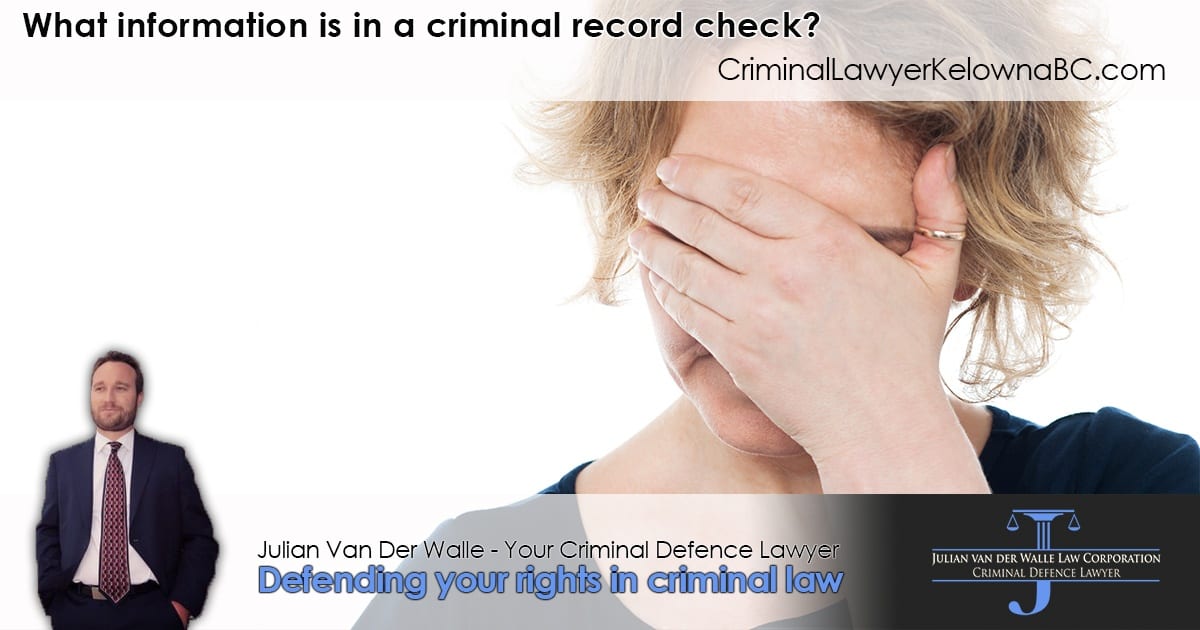What information is in a criminal record check?

There is an old saying that the only two things that are certain in life are death and taxes. There should be a third thing added to that list, however: your criminal record will stay with you for the rest of your life unless it is legally expunged in accordance with law. Under the federal Criminal Records Act, all criminal records must be preserved by the federal government for review.
There are many reasons why someone may want to check your criminal records; however, in most cases, your criminal record will be checked when you apply for a job. Employers often want to know about a job applicant’s criminal history to determine whether the job applicant may be a risk to customers or to the business. It is not uncommon for people with criminal records to have a harder time finding a job, as employers are generally cautious about hiring anyone with a prior criminal conviction. As a result, it is important for you to understand what type of information is available.
About Standard Police Information Checks
When a police information check is requested, the police will return a criminal record report to the applicant for a small fee. To compile the report, the police will check all available criminal databases in Canada including the Police Information Portal, which compiles records from local police databases across Canada, the Justice Information system, which contains information specifically about British Columbia Courts, and any historical or legacy police records that may exist.
The types of information provided in a standard police information check include:
- A list of charges and convictions, including pending charges;
- Any substantiated adverse contact the person has had with the police (such as where the individual is a police suspect in a crime); and
- Any pardoned sex crimes offenses.
If you are concerned about what your Police Information Check may review about you, you should request one for yourself. Additionally, many employers may require you to provide your own Police Information Check during the hiring process. The cost is about $25.00, and it will tell you what criminal records have been retained on you. If you disagree with any of the information on the information check, you can contest the record with the government.
Information About the British Columbia Criminal Records Review Program
In certain cases, volunteer organizations are allowed to use the British Columbia Criminal records Review Program to obtain more basic information about their volunteers for no charge. Only volunteer organizations that work with either children or vulnerable adults qualify for a free Criminal Records Review Report, as the program is specifically designed to protect at-risk populations from people who may still be dangerous.
Unlike a Police Information Check, the Criminal Records Review Program does not provide a full listing of a person’s prior criminal offenses. Instead, the volunteer organization requesting the check will receive a letter from the Criminal Records Review Program containing a very simple recommendation of either “cleared” or “not cleared” to work with children or vulnerable adults. In most cases, these “not cleared” recommendations will be based on either prior sex-related crimes or more serious violent crimes such as assault.
Can I Get My Criminal Record Removed?
It is possible for a person with a criminal record to apply for an “expungement” or a “pardon” under the Criminal Records Act. All Canadian criminal law is federal law, and therefore the federal government must be willing to grant a formal pardon before your criminal record can be erased. To qualify for a pardon, the person petitioning for the pardon will need to prove to the Parole Board that they are now a citizen of good character. There are restrictions on applications for pardons, however.
A criminal pardon cannot be granted on an indictable offense until at least ten years after the pardon applicant has completed serving his or her time, paid all fines, and completed the probationary term. Similarly, a pardon cannot be granted on a summary conviction offense until at least five years after the terms of the conviction have been fully served.
Additionally, some offenses can never be pardoned and will remain on your criminal record until you die. First, any type of sexual assault or any other sex-related crime cannot be fully pardoned under any circumstances. While a sex crime can be technically pardoned, a record of the conviction will always remain. Second, anyone with more than three convictions on indictable offenses can never be pardoned.
Related Stories
Does drug addiction cause more crime?
As a whole, the Canadian justice system is very fair. The accused enjoy the right to be present and be heard in court, the right to remain silent, and the right to representation by legal counsel. That last right is one of the most important rights of...
Why You Should Hire a Kelowna Criminal Defense Attorney
As a whole, the Canadian justice system is very fair. The accused enjoy the right to be present and be heard in court, the right to remain silent, and the right to representation by legal counsel. That last right is one of the most important rights of...
Understanding Your Rights at a Roadblock
Roadblocks are a tool commonly used by the police in Canada to detect traffic infractions and alcohol violations on a large scale. In most cases, drivers will see roadblocks set up on major roads on holiday weekends or late at night around the time when...
